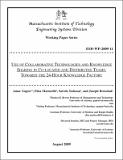| dc.description.abstract | The relocation of knowledge work to emerging countries is leading to an increasing use of Globally Distributed Teams (GDT) engaged in complex tasks. In the present study, we investigate a particular type of GDT working ‘around the clock’: the 24 hours knowledge factory (Gupta, 2008). Adopting the productivity perspective on knowledge sharing (Haas and Hansen, 2005, 2007), we develop 11 hypotheses to compare technology use, knowledge sharing processes, and performance of a 24 hours knowledge factory with a co-located team. We conducted a quasi-experiment in IBM and collected both quantitative and qualitative data, over a period of 12 months, on a GDT and a co-located team. Both teams were composed of the same number of professionals, provided with the same technologies, engaged in similar tasks, and given similar deadlines. We found that they differed in their use of technologies and in knowledge sharing processes, but not in efficiency and quality of outcomes. We show how the co-located team and the GDT enacted a knowledge codification strategy and a personalization strategy respectively; in each case, they grafted elements of the other strategy in order to attain both knowledge re-use and creativity. We conclude by discussing theoretical contributions to knowledge sharing and GDT literatures, and by highlighting managerial implications to those organizations interested in developing a fully functional 24 hour knowledge factory. | en_US |
